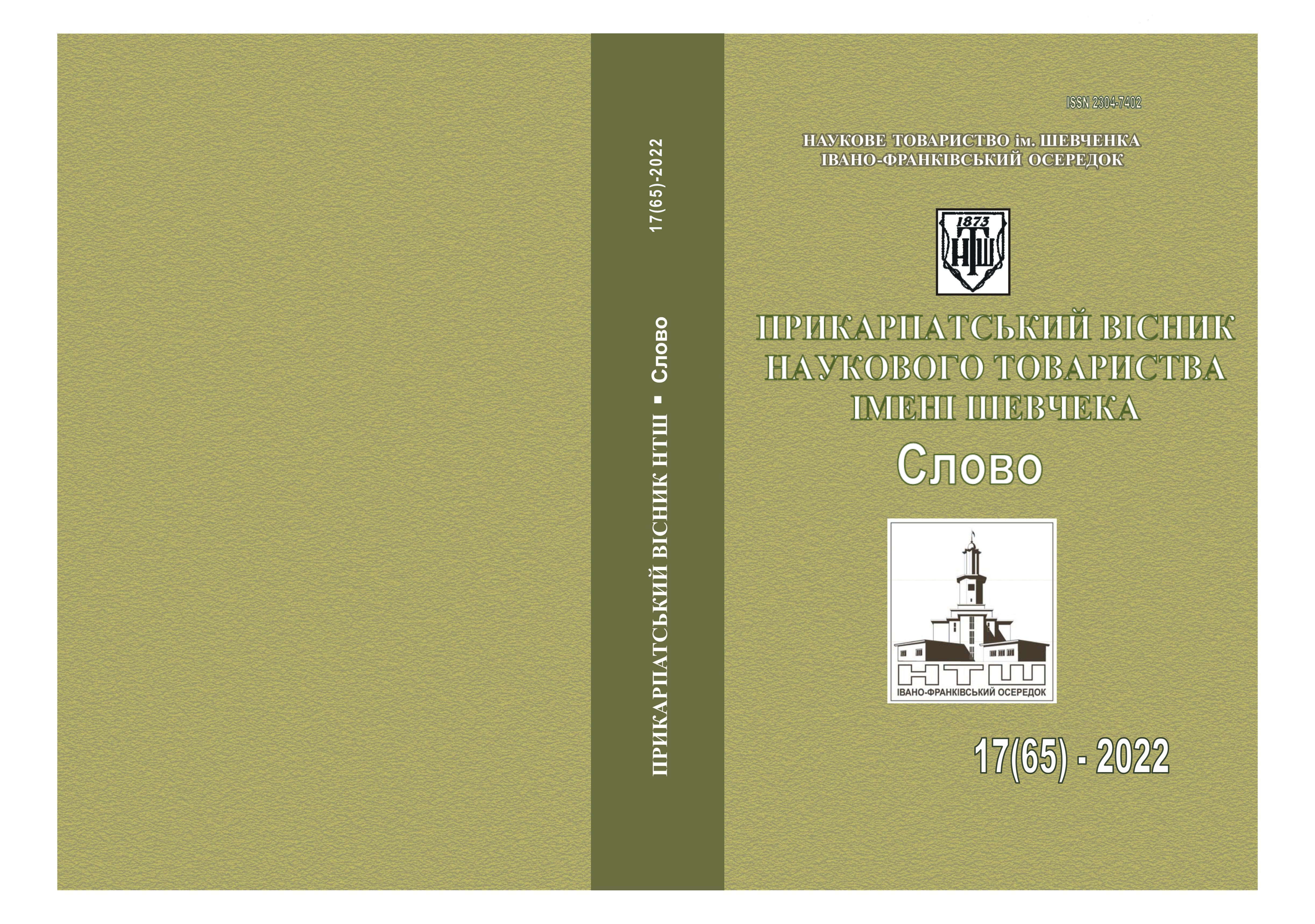KINDER IM NACHKRIEGS-WIEN IN JOSEPH ROTHS FEUILLETONS VON 1919/20
DOI:
https://doi.org/10.31471/2304-7402-2022-17(65)-272-281Ключові слова:
журналістика, фейлетони, діти, соціальні проблеми, ідеологія, освітня реформа, Йозеф Рот, Отто Ґльокель, Австрійська республіка.Анотація
Стаття присвячена дослідженню особливостей зображення класиком австрійської літератури ХХ ст., уродженцем Бродів на Галичині Йозефом Ротом (1894–1939), місця і ролі дітей в умовах повоєнного Відня на сторінках ліво-ліберальної місцевої газети «Der Neue Tag» у 1919–1920 рр. Зовнішнім тлом досліджуваної проблеми є розпад національно-державного порядку довоєнної Європи, руйнування колишніх ціннісних і культурних структур, долі «втраченого покоління». Стверджується, що ці чинники відображали ситуацію бездомності, абсолютної відчуженості і порожнечі в індивідуальному, соціальному і метафізичному сенсі безіменних героїв фейлетонів Й. Рота, які можна розглядати як авторську журналістську реакцію на соціальні проблеми досліджуваного хронотопу. Зазначається, що більшість з проаналізованих текстів Й. Рота опубліковані у тематичній газетній рубриці «віденські симптоми», присвяченій зокрема описові проблеми дітей найбідніших і найнезахищеніших верств міського населення столиці Австрійської Республіки. Як журналіст Й. Рот вказує на жалюгідні умови їхнього життя, соціальне страждання і власне обурення бездіяльністю інститутів влади щодо фактів невідвідування дітьми-сиротами закладів освіти. Підкреслюється, що Й. Рот у проаналізованих фейлетонах висловлювався з величезним ентузіазмом про освітню реформу 1919–1934 рр. австрійського політика соціал-демократа, реформатора шкільної освіти Отто Ґльокеля, вважаючи, що її реалізація змінить австрійську молодь, яка протистоятиме крайнім політичним ідеологіям. З’ясовується, що на підставі вивчення досвіду окремих сімей у фейлетонах Й. Рота можна стверджувати про певну закономірність розвитку майбутнього дітей, їхньої фактичної приреченості повторювати долю своїх батьків. Результати дослідження. Висновується, що зображення дітей в умовах повоєнного Відня у фейлетонах майбутнього австрійського класика можна вважати особливим прикладом переплетіння тогочасних проблем моралі, локальної політики та шкільної освіти, детермінованого суб’єктивізмом Й. Рота як журналіста-початківця.
Посилання
Донцов Д. Рік 1918, Київ. Торонто: «Гомін України», 1954.
Göttlicher W. Otto Glöckels Schulreform, das Rote Wien und die deutsche Reformpädagogik. Zur Einordnung der Glöckelschen Schulreform, 1919-1934. De Vincenti A., Grube N., Hoffmann-Ocon A. [Hrsg.]: 1918 in Bildung und Erziehung. Traditionen, Transitionen, Visionen. Bad Heilbrunn: Verlag Julius Klinkhardt, 2020. S. 229–250.
Herczeg P. «Die Weltgeschichte kümmert sich zu wenig um Sonnenstrahlen». Die politische und soziale Dimension im journalistischen Werk von Joseph Roth. Journalistik. Zeitschrift für Journalismusforschung. Heft 2, 2. Jahrgang. Köln: Herbert von Halem Verlag, 2019. S. 118–133.
Holmes D. Joseph Roth's Feuilleton Journalism as Social History in Vienna, 1919-20. Austrian History Yearbook, V. 48, 2017. pp. 255–265.
Lunzer H., Lunzer-Talos V. Joseph Roth im Exil in Paris 1933 bis 1939. Wien: Zirkular, 2009.
Roth J. «Versuchsklassen». Joseph Roth Werke. Erster Band: Das journalistische Werk 1915–1923. Hrsg. von Klaus Westermann. Mit einem Vorwort zur Werkausgabe von Fritz Hackert und Klaus Westermann. Köln: Kiepenheuer & Witsch, 2009. S. 261–264.
Roth J. Das Frühlingsschiff. Joseph Roth Werke. Erster Band: Das journalistische Werk 1915–1923. Hrsg. von Klaus Westermann. Mit einem Vorwort zur Werkausgabe von Fritz Hackert und Klaus Westermann. Köln: Kiepenheuer & Witsch, 2009. S. 279–281.
Roth J. Die Bar des Volkes. Joseph Roth Werke. Erster Band: Das journalistische Werk 1915–1923. Hrsg. von Klaus Westermann. Mit einem Vorwort zur Werkausgabe von Fritz Hackert und Klaus Westermann. Köln: Kiepenheuer & Witsch, 2009. S. 220–222.
Roth J. Die Mülli! Joseph Roth Werke. Erster Band: Das journalistische Werk 1915–1923 / Hrsg. von Klaus Westermann. Mit einem Vorwort zur Werkausgabe von Fritz Hackert und Klaus Westermann. Köln: Kiepenheuer & Witsch, 2009. S. 35–37.
Roth J. Die weißen Städte. Joseph Roth Werke. Zweiter Band: Das journalistische Werk 1924–1928. Hrsg. und mit einem Nachwort von Klaus Westermann. Köln: Kiepenheuer & Witsch, 2009. S. 451–526.
Roth J. Eine Kaffeehausterrasse und eine andere. Joseph Roth Werke. Erster Band: Das journalistische Werk 1915–1923. Hrsg. von Klaus Westermann. Mit einem Vorwort zur Werkausgabe von Fritz Hackert und Klaus Westermann. Köln: Kiepenheuer & Witsch, 2009. S. 42–43.
Roth J. Kinder nach Milano. Joseph Roth Werke. Erster Band: Das journalistische Werk 1915–1923. Hrsg. von Klaus Westermann. Mit einem Vorwort zur Werkausgabe von Fritz Hackert und Klaus Westermann. Köln: Kiepenheuer & Witsch, 2009. S. 208–210.
Roth J. Mai und Mais. Joseph Roth Werke. Erster Band: Das journalistische Werk 1915–1923. Hrsg. von Klaus Westermann. Mit einem Vorwort zur Werkausgabe von Fritz Hackert und Klaus Westermann. Köln: Kiepenheuer & Witsch, 2009. S. 30–32.
Roth J. Oberschlesien. Joseph Roth Werke. Erster Band: Das journalistische Werk 1915–1923. Hrsg. von Klaus Westermann. Mit einem Vorwort zur Werkausgabe von Fritz Hackert und Klaus Westermann. Köln: Kiepenheuer & Witsch, 2009. S. 570–573.
Sternburg W. von. Joseph Roth. Eine Biographie. Köln: Kiepenheuer & Witsch, 2009.
Westermann K. Nachwort . Joseph Roth Werke. Erster Band: Das journalistische Werk 1915–1923 / Hrsg. von Klaus Westermann. Mit einem Vorwort zur Werkausgabe von Fritz Hackert und Klaus Westermann. Köln: Kiepenheuer & Witsch, 2009. S. 1109–1116.
Wirtz I. Joseph Roths Fiktionen des Faktischen: das Feuilleton der zwanziger Jahre und «Die Geschichte von der 1002. Nacht» im historischen Kontext. Berlin: Erich Schmidt Verlag GmbH & Co., 1997.

